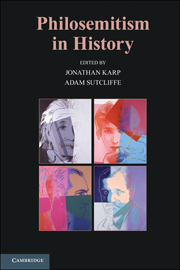Book contents
- Frontmatter
- Contents
- Notes on Contributors
- Introduction
- PART I MEDIEVAL AND EARLY MODERN FRAMEWORKS
- PART II THREE EUROPEAN PHILOSEMITES
- PART III THE CULTURAL POLITICS OF PHILOSEMITISM IN VICTORIAN BRITAIN AND IMPERIAL GERMANY
- PART IV AMERICAN PHILOSEMITISMS
- 10 Ethnic Role Models and Chosen Peoples
- 11 Connoisseurs of Angst
- 12 “It's All in the Bible”
- PART V PHILOSEMITISM IN POST-HOLOCAUST EUROPE
- Index
- References
12 - “It's All in the Bible”
Evangelical Christians, Biblical Literalism, and Philosemitism in Our Times
Published online by Cambridge University Press: 05 June 2012
- Frontmatter
- Contents
- Notes on Contributors
- Introduction
- PART I MEDIEVAL AND EARLY MODERN FRAMEWORKS
- PART II THREE EUROPEAN PHILOSEMITES
- PART III THE CULTURAL POLITICS OF PHILOSEMITISM IN VICTORIAN BRITAIN AND IMPERIAL GERMANY
- PART IV AMERICAN PHILOSEMITISMS
- 10 Ethnic Role Models and Chosen Peoples
- 11 Connoisseurs of Angst
- 12 “It's All in the Bible”
- PART V PHILOSEMITISM IN POST-HOLOCAUST EUROPE
- Index
- References
Summary
In 1982, Israel's prime minister, Menahem Begin, bestowed a medal on Jerry Falwell, one of the better-known American evangelists at the time. To many, Begin's choice seemed weird, as did the friendship that had developed between Israelis and evangelical Christians in general. Surprisingly, mission-oriented conservative Christians have become friends and supporters of Jewish causes, mustering political and economic support for the state of Israel, as well as helping needy Jews in Israel and elsewhere. Messianically oriented evangelical Christians have become Israel's most dedicated friends, involving themselves with the well-being of the Jewish people and the Jewish state. While evangelical Christians have not fully abandoned well-rooted cultural stereotypes of Jews, they consider themselves to be ardent philosemites who care deeply about the Jews and their future.
The evangelical Christians' concern over the well-being of the Jews and their wish to see the Jews return to their ancestral homeland have a long history. From the perspective of conservative evangelical Christians, their philosemitic standing is an outcome of their biblical-pietist faith, their outlook on Jews meshing well with their larger worldview on the Bible and on the course of history. The pietist and evangelical advocacy of Jewish restoration to Zion affected the development of the Zionist ideal in the nineteenth and twentieth centuries and influenced the attitudes of governments, mostly in the English-speaking world, toward Zionism and the state of Israel. Support for Zionism, however, has been only one aspect of the manner in which philosemitic evangelicals have related to the Jews.
- Type
- Chapter
- Information
- Philosemitism in History , pp. 257 - 286Publisher: Cambridge University PressPrint publication year: 2011
References
- 1
- Cited by



